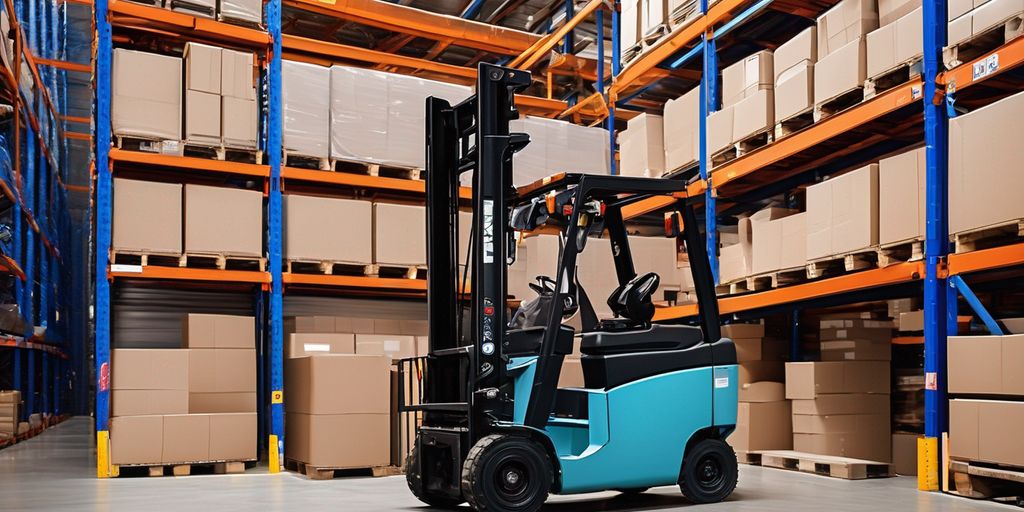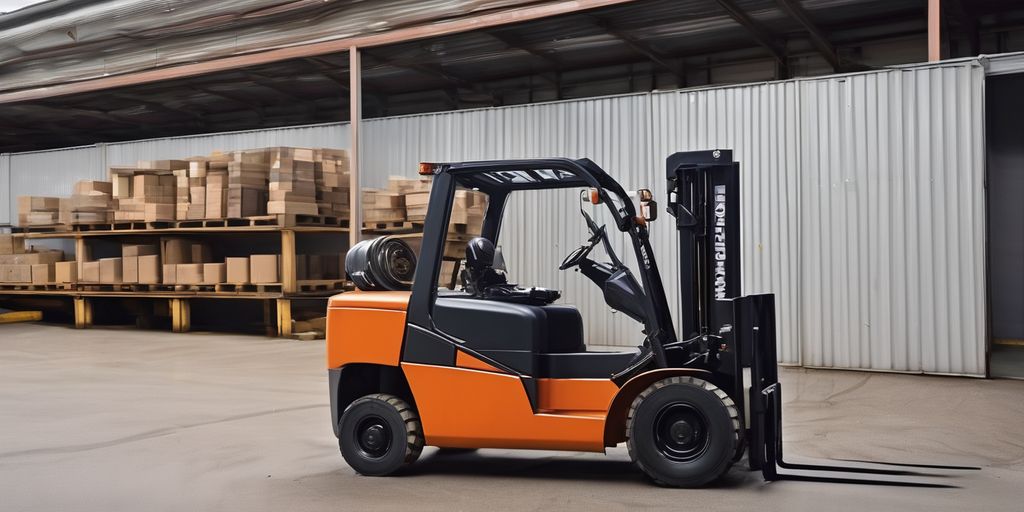Forklifts are a common sight in warehouses, construction sites, and manufacturing facilities, and their operators must be trained and certified to minimize accidents and injuries. Our training program adheres to industry standards and regulatory requirements to ensure you receive the best education available. Comprehensive forklift training is essential for building a skilled workforce that is safe, efficient, and compliant.
Key Takeaways
- Proper forklift training programs reduce workplace accidents and injuries.
- Comprehensive training enhances operational efficiency and meets regulatory requirements.
- Innovative training solutions like virtual reality and mobile platforms are transforming the industry.
- Forklift certification leads to improved safety records, increased employee morale, and reduced insurance costs.
- Selecting the right training provider involves evaluating program quality, cost-effectiveness, and compliance.
The Importance of Forklift Training Programs
Forklift training programs are essential for any workplace that relies on these powerful machines. Proper training significantly reduces the risk of workplace accidents, ensuring a safer environment for all employees. This not only protects workers but also minimizes costly damages and operational disruptions.
Reducing Workplace Accidents
Forklifts can be hazardous if not operated correctly. Comprehensive training equips operators with the skills to handle forklifts safely, thereby minimizing the risks of accidents, injuries, and fatalities. This is crucial for maintaining a safe work environment and protecting the well-being of all employees.
Enhancing Operational Efficiency
Quality forklift training encompasses comprehensive instructional programs that teach prospective forklift operators about safe and efficient handling. Well-trained operators are more confident and efficient, leading to higher productivity and smoother operations. This efficiency translates to better overall performance and a more streamlined workflow.
Meeting Regulatory Requirements
Aligning with OSHA standards and requirements, forklift training programs ensure that operators understand the essentials of forklift operation, design limitations, and material handling. Compliance with these regulations is not just a legal obligation but also a critical component of a safe and efficient workplace.
Components of a Comprehensive Forklift Training Program
A well-rounded forklift training program is essential for ensuring that operators are skilled, safe, and efficient in their roles. Comprehensive training typically includes a mix of classroom instruction, hands-on practice, and modern e-learning modules to cover all aspects of forklift operation and safety.
Classroom Instruction
Classroom instruction provides the theoretical foundation necessary for understanding forklift operations. Topics often include safety regulations, equipment maintenance, and operational guidelines. This structured approach ensures that trainees are well-versed in the key components of forklift safety and compliance.
Hands-On Training
Hands-on training is crucial for translating theoretical knowledge into practical skills. Trainees get the opportunity to operate forklifts under supervised conditions, allowing them to become familiar with the equipment and its various functions. This practical experience is invaluable for building confidence and competence.
E-Learning Modules
E-learning modules offer a flexible and accessible way to supplement traditional training methods. These modules can cover a wide range of topics, from basic operational procedures to advanced safety protocols. The use of e-learning ensures that training is continuous and up-to-date with the latest industry standards.
A forklift training checklist is a structured document or tool that outlines the key components and steps required to train individuals in the safe and efficient operation of forklifts.
Developing an In-House Forklift Training Program
Creating an in-house forklift training program can be a cost-effective and convenient solution for many companies. Rather than hiring an outside contractor, companies can manage all safety procedures and training internally. This approach allows for training to be tailored specifically to the company's equipment and protocols, ensuring that employees are well-versed in the exact machinery they will be using daily.
Innovative Forklift Training Solutions
Virtual Reality Training
Virtual reality (VR) training offers a cutting-edge approach to forklift education. By simulating real-world scenarios, VR allows operators to practice and hone their skills in a safe, controlled environment. This method not only enhances learning but also significantly reduces the risk of accidents during training.
Mobile Learning Platforms
Mobile learning platforms provide flexibility and convenience, enabling employees to access training materials anytime, anywhere. These platforms often include interactive modules, quizzes, and videos, making the learning process engaging and effective. This approach is particularly beneficial for maximizing warehouse efficiency as it allows for continuous learning without disrupting daily operations.
Interactive Simulations
Interactive simulations are another innovative solution that helps in ensuring safety and efficiency in forklift operations. These simulations replicate various operational challenges, allowing trainees to develop problem-solving skills and adapt to different scenarios. This hands-on experience is invaluable for building a skilled workforce.
Embracing these innovative training solutions is crucial for staying ahead in the ever-evolving material handling industry. They not only improve safety and efficiency but also prepare the workforce for future technological advancements.
Benefits of Forklift Certification
Improved Safety Records
Forklift certification plays a crucial role in enhancing workplace safety. Certified operators are well-versed in safety protocols, significantly reducing the risk of accidents and injuries. This not only protects employees but also minimizes potential damage to equipment and inventory.
Increased Employee Morale
When employees receive proper training and certification, it boosts their confidence and job satisfaction. Knowing that they are equipped with the necessary skills to perform their tasks safely and efficiently can lead to higher morale and a more positive work environment.
Reduced Insurance Costs
Insurance companies often offer lower premiums to businesses with certified forklift operators. This is because certified operators are less likely to be involved in accidents, which reduces the number of claims. Consequently, businesses can save on insurance costs while maintaining a safer workplace.
Certification is crucial for forklift operators. It not only ensures your competence but also demonstrates your commitment to safety and compliance.
Selecting the Right Forklift Training Provider
Choosing the right forklift training provider is crucial for ensuring that your operators are well-prepared and your workplace remains safe. Here are some key factors to consider:
Evaluating Program Quality
When selecting a training provider, it's essential to assess the quality of their programs. Look for providers that offer comprehensive training covering both theoretical and practical aspects. Positive reviews from former students can be a good indicator of the training's reliability and effectiveness.
Considering Cost-Effectiveness
Cost is an important factor, but it shouldn't be the only consideration. Compare the fees of different providers to find a training that fits your budget. Remember, the cheapest option might not always offer the best value. Investing in a quality program can lead to long-term savings by reducing accidents and increasing efficiency.
Checking Accreditation and Compliance
Ensure that the training provider is accredited and complies with industry standards and regulatory requirements. This guarantees that the training you receive is up-to-date and meets all necessary safety guidelines. Accredited programs are more likely to provide comprehensive training that covers essential skills every forklift operator should master.
Maintaining Ongoing Forklift Training

Ensuring continuous training for forklift operators is crucial for maintaining a safe and efficient workplace. Regular refresher courses help keep operators updated on the latest safety protocols and operational techniques.
Regular Refresher Courses
Regular refresher courses are essential to reinforce safety practices and operational skills. These courses should be scheduled periodically to ensure that all operators are up-to-date with the latest industry standards and regulations.
Tracking Training Progress
Tracking the progress of each operator's training is vital. Implementing a system to monitor and record training activities can help identify areas where additional training may be needed. This ensures that all operators maintain a high level of competency.
Adapting to New Technologies
The forklift industry is continually evolving with new technologies and equipment. It's important to adapt training programs to include these advancements. This not only improves operational efficiency but also enhances safety by ensuring operators are familiar with the latest tools and techniques.
Staying up to date with forklift training is not just about compliance; it's about creating a culture of safety and efficiency in the workplace.
Conclusion
In conclusion, forklift training programs are essential for building a skilled and safe workforce in industries where forklifts are a common sight. By adhering to industry standards and regulatory requirements, these programs not only minimize accidents and injuries but also enhance overall productivity and employee morale. Investing in comprehensive forklift training solutions ensures that all employees, from operators to pedestrians, are well-informed and capable of working confidently around lift trucks. As businesses continue to evolve, the importance of modern, accessible, and effective training programs cannot be overstated. Ultimately, a well-trained workforce is a cornerstone of operational success and safety.
Frequently Asked Questions
Why is forklift training important?
Forklift training is crucial for reducing workplace accidents, enhancing operational efficiency, and meeting regulatory requirements. Proper training ensures that operators are skilled and knowledgeable, which minimizes the risk of injuries and damages.
What are the main components of a forklift training program?
A comprehensive forklift training program typically includes classroom instruction, hands-on training, and e-learning modules. These components ensure that operators receive both theoretical knowledge and practical experience.
How can we develop an in-house forklift training program?
To develop an in-house forklift training program, you need to assess training needs, create a curriculum, and ensure compliance with OSHA standards. This approach allows for customized training that meets your specific operational requirements.
What innovative solutions are available for forklift training?
Innovative forklift training solutions include virtual reality training, mobile learning platforms, and interactive simulations. These technologies provide immersive and flexible learning experiences for operators.
What are the benefits of forklift certification?
Forklift certification offers several benefits, including improved safety records, increased employee morale, and reduced insurance costs. Certified operators are more confident and competent, which contributes to a safer and more efficient workplace.
How do we select the right forklift training provider?
When selecting a forklift training provider, evaluate the quality of their program, consider cost-effectiveness, and check their accreditation and compliance with regulatory standards. A reputable provider will offer comprehensive and up-to-date training solutions.




Leave a comment
This site is protected by hCaptcha and the hCaptcha Privacy Policy and Terms of Service apply.